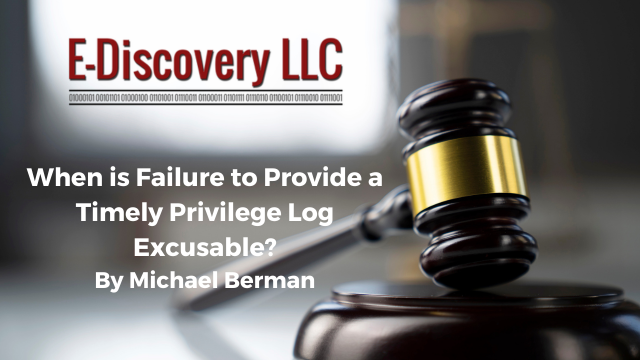 Image: Kaylee Walstad, EDRM.
Image: Kaylee Walstad, EDRM.
In Melton Properties, LLC v. Ill. Central R. Co., 2024 WL 3015749 at *5 (N.D. Miss. June 14, 2024), the court listed the factors to consider in deciding when the failure to provide a timely privilege log is – or is not – a waiver of the privilege.
GENERALLY, FAILURE TO TIMELY PROVIDE A PRIVILEGE LOG MAY WAIVE PRIVILEGE
It is well established that privilege may be waived if it was not timely asserted in a proper log. See, e.g., Court Holds Privilege Was Waived by Failure to Timely Provide a Privilege Log (May 30, 2024).
Furthermore, even when privilege objections are timely asserted, the failure to produce a proper privilege log generally constitutes waiver of the privilege objections.” [emphasis added].
Melton Properties, LLC v. Ill. Central R. Co., 2024 WL 3015749 (N.D. Miss. June 14, 2024).
For example: “Absent consent of the adverse party, or a Court order, a privilege log (or other communication of sufficient information for the parties to be able to determine whether the privilege applies) must accompany a written response to a Rule 34 document production request, and a failure to do so may constitute a forfeiture of any claims of privilege.” Mezu v. Morgan State Univ., 269 F.R.D. 565, 577 (D. Md. 2010)(emphasis added); see, e.g., Court Excused Party From Waiver by Failure to Provide Specific Objections (Aug. 7, 2022).
In Bautech USA, Inc. v. Resolve Equip., Inc., 2024 WL 1929486 (S.D. Fla. May 2, 2024), privilege was waived because of untimely privilege logging.
THE MELTON FACTORS
In Melton, 2024 WL 3015749, at *5, the court recognized the general rule: “[A]s a general rule, when a party fails to object timely to interrogatories, production requests, or other discovery efforts, objections thereto are waived…. Furthermore, even when privilege objections are timely asserted, the failure to produce a proper privilege log generally constitutes waiver of the privilege objections.” [emphasis added].
The Melton court then listed the countervailing factors, writing:
On the other hand, Federal Rule 33(b)(4) provides that “[a]ny ground not stated in a timely objection is waived unless the court, for good cause, excuses the failure.” (emphasis added). “In deciding whether good cause exists, courts consider (1) the length of the delay in failing to object; (2) the reason for the delay; (3) whether there was any bad faith or dilatory action of the party that failed to object; (4) whether the party seeking discovery was prejudiced by the failure; (5) whether the document production request was properly framed and not excessively burdensome; and (6) whether waiver would impose an excessively harsh result on the defaulting party.”
Id. (citation omitted).
APPLICATION IN MELTON
In Melton, plaintiffs sought attorneys’ fees totaling $979,705.03, and defendant wanted production of itemized attorneys’ bills.
Defendants’ expert reported “that he was unable to fully evaluate [plaintiffs’ accountant’s expert] opinions related to Plaintiffs’ ‘attorney bills’ because he was ‘unable to ascertain hours and rates billed, what tasks were performed and how the tasks pertain to this litigation’ due to not having access to the itemized billing statements.”
Plaintiffs took the position that the discovery requests did not ask for the bills and, in any event, they were privileged. Defendant took the position that plaintiffs had failed to assert privilege in an objection to the discovery.
The court held that one interrogatory failed to request production of the bills. Id. at *5. Another “could be construed” to request them; however, it violated Fed.R.Civ.P. 34(b) because it was vague and over broad. Id.
The court also wrote that plaintiffs’ “blanket” privilege assertion in opposition to the motion was improper. Id. at *6. The “entire circumstance” was “further complicated” because a party who was an attorney provided detailed time entries. Id.
The court wrote:
In short, I find it inescapable to conclude anything but, under these circumstances, both Plaintiffs and Defendant have contributed to the current last minute discovery morass.
It then weighed the listed factors. It ordered production of time entries not subject to a privilege, and that: “Any matters as to which privilege is claimed shall be recorded in a privilege log pursuant to FRCP 26(b)(5) and Local Civil Rule 26(e).”
In short, faced with a “morass,” where the discovery requests were less than clear, and perhaps under factors such as “whether the document production request was properly framed and not excessively burdensome,” “the reason for the delay,” and, “whether there was any bad faith or dilatory action of the party that failed to object,” on the facts presented, good cause had been shown to excuse the absence of a timely privilege log.